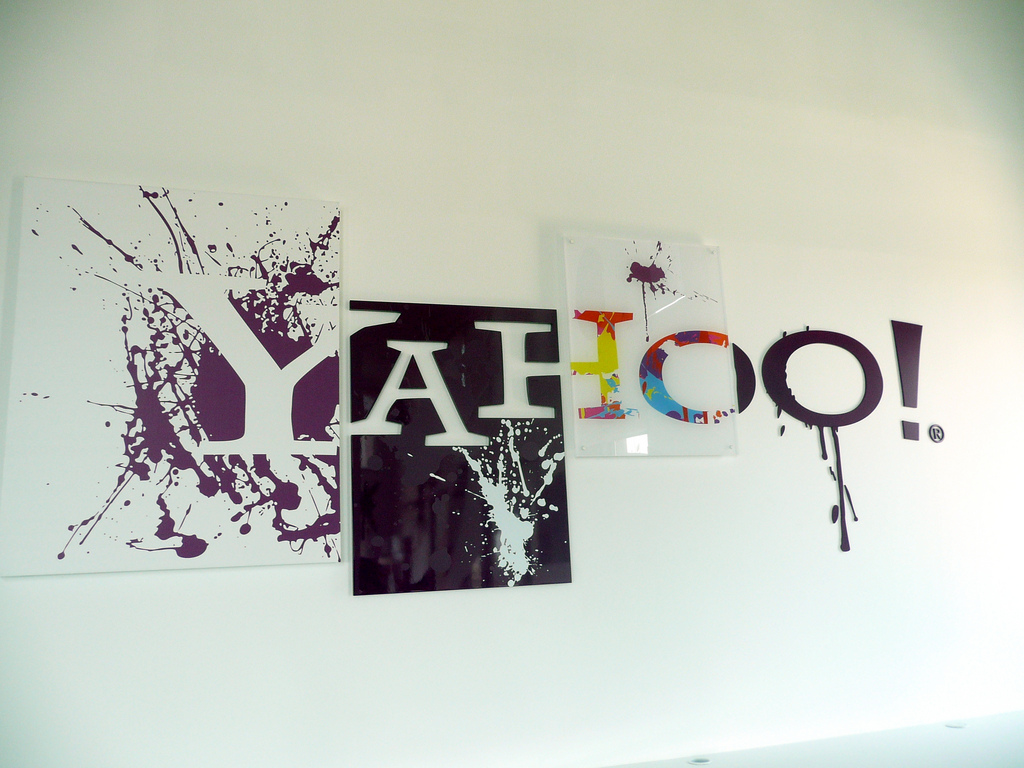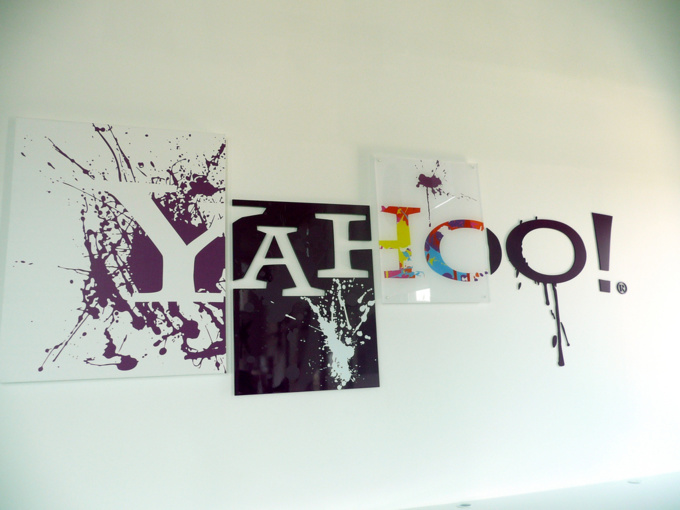Over 20 years of existence, Yahoo has been managed by a string of top executives, and could not find a definite answer to the question "what Yahoo is? ". Its strategic priorities are constantly changing - from media to technology and vice versa.
Yahoo was founded in 1994 by graduates of Stanford University, Jerry Yang and David Filo. Initially, they created a catalog of web sites, called "Jerry and David's Guide on the World Wide Web." Web sites for the catalog were selected manually.
The first CEO of Yahoo was Tim Koogle. When he joined the company in 1995, Yahoo had no profit, only six employees and, according to a recruiter, was "in desperate need for an adult leader". Two years later, Yahoo’s audience already had 25 million unique users per month. Yahoo’s directory included 735,000 websites, the users were offered a free mail service, news feed and chats.
By 2000, explosive growth of the Internet audience provided Yahoo with 100 million users. The company’s workforce reached 2,000 employees. Unlike its competitors of that time, Yahoo was profitable through online advertising.
Then, the dotcom bubble burst. Shares of Yahoo fell 93% in 20 months. Koogle resigned in 2001, and the company made its first attempt to restart after crisis.
Terry Semel, the new CEO, who came from Warner Bros., tried to turn Yahoo into a media company, focusing on the premium paid services, such as a hotline with an astrologer for $ 14.95 per a question. Yahoo has stopped investing in R&D.
In 2004, Yahoo paid $ 1.9 billion for two companies to develop search technology, and began to build up its own search engine.
In 2006, Semel’s team missed a good buy, which could have made Yahoo a leader. Semel tried to discuss purchase of Facebook for $ 1 billion, but failed during price negotiations. Now, Facebook’s market cap exceeds $ 340 billion.
In 2007, Yahoo's revenue was $ 7 billion - less than half of Google’s. In the same year, Semel resigned. His post was claimed by one of the company’s co-founders, Yang, who proclaimed another radical reform. In 2008, he refused Microsoft's offer to buy Yahoo for about $ 45 billion (60% premium to the market price). This decision infuriated investors, and Yang was forced to resign in November 2008.
Control over Yahoo was taken by Carol Bartz, who previously led Autodesk. She invested in news, sports and financial services, hired journalists and acquired a cheap popular content maker. A number of managers have left the company, and revenues started a protracted decline. In September 2011, Bartz was fired.
The next was Scott Thompson, former President of PayPal, who decided to focus on online trade but eventually failed. In 2012, he had to resign because of the scandal with his CV: his academic credentials were fake.
Marissa Mayer, a former manager at Google products, came to lead Yahoo in 2012. She focused on Yahoo Mail and Flickr photo service, as well as on mobile applications, online video and web search.
Top managers never wanted Yahoo to be just a technology company. They dreamed of a media empire. While all IT-giants tried hard to get the best programmers, Yahoo paid little attention to this sphere. This strategy had been considered unpromising back in 2008, yet Mayer is still sticking to it. Yahoo does not fight for talented technology professionals, and this prevents the company from developing as fast as, for example, Uber does.
Arrival of Marissa Mayer was associated with focusing on user-friendly services and Yahoo’s growth as a search engine. Instead, the CEO focused on media and has concluded expensive contracts with media stars such as TV presenter Katie Couric and writer David Pogue. The contract with Couric, for example, costs the company $ 10 million a year. Yahoo has invested $ 42 million in TV series ‘Community’ and two other TV shows. In May of 2015, the IT-giant plunked down $ 3 million to sponsor Met Gala; other $ 2 million went to the World Economic Forum in Davos in January 2015.
Since the end of 2012, Mayer has been harshly criticized for inefficient management. Many executives left their posts, the share price has fallen sharply, and internal expences, by contrast, grew up. Eric Jackson, Head of a hedge fund and Yahoo’s shareholder even gave the Board of Directors a 99-page presentation on Mayer’s errors and needless spending, demanding her resignation. In particular, he mentioned purchase of 22,000 iPhones and free food for employees, which costs the company $ 108 million a year.
Mayer’s huge investments in startups are also generating doubts. During her work, Yahoo has acquired about 40 different projects, most of which suffered an unenviable fate. Because of this, the company even acquired a reputation of a " start-ups killer". Tumblr, which Yahoo bought for $ 1.1 billion in 2013, is now valued at $ 260 million.
Tension in the company is constantly growing, especially after Mayer dismissed 1,100 employees in the first quarter of 2015, and mentioned that the staff will be cut further.
In 2013, Mayer restricted teleworking, but organized a private kindergarten for her newborn son in the office. This made her particularly unpopular in the company.
Mayer has led Yahoo during four years. Observers wonder if she knows what to do with the company further. Analysts note that Yahoo is rapidly losing advertisers: they increasingly ignore the IT-giant and desert to Google or Facebook.
In the beginning of 2016, Mayer announced plans to cut more than 1,700 people, which is 15% of employees. In addition to the layoffs, she is going to close five international offices and seven media products of the company. The Board hired consultants from McKinsey to understand what to get rid of, what to sell and what to focus on. The new plan was code-named "Family Business", and aimed on development of Yahoo’s products in Silicon Valley and refusal of former ambitions.
source: wsj.com, nypost.com, businessinsider.com
Yahoo was founded in 1994 by graduates of Stanford University, Jerry Yang and David Filo. Initially, they created a catalog of web sites, called "Jerry and David's Guide on the World Wide Web." Web sites for the catalog were selected manually.
The first CEO of Yahoo was Tim Koogle. When he joined the company in 1995, Yahoo had no profit, only six employees and, according to a recruiter, was "in desperate need for an adult leader". Two years later, Yahoo’s audience already had 25 million unique users per month. Yahoo’s directory included 735,000 websites, the users were offered a free mail service, news feed and chats.
By 2000, explosive growth of the Internet audience provided Yahoo with 100 million users. The company’s workforce reached 2,000 employees. Unlike its competitors of that time, Yahoo was profitable through online advertising.
Then, the dotcom bubble burst. Shares of Yahoo fell 93% in 20 months. Koogle resigned in 2001, and the company made its first attempt to restart after crisis.
Terry Semel, the new CEO, who came from Warner Bros., tried to turn Yahoo into a media company, focusing on the premium paid services, such as a hotline with an astrologer for $ 14.95 per a question. Yahoo has stopped investing in R&D.
In 2004, Yahoo paid $ 1.9 billion for two companies to develop search technology, and began to build up its own search engine.
In 2006, Semel’s team missed a good buy, which could have made Yahoo a leader. Semel tried to discuss purchase of Facebook for $ 1 billion, but failed during price negotiations. Now, Facebook’s market cap exceeds $ 340 billion.
In 2007, Yahoo's revenue was $ 7 billion - less than half of Google’s. In the same year, Semel resigned. His post was claimed by one of the company’s co-founders, Yang, who proclaimed another radical reform. In 2008, he refused Microsoft's offer to buy Yahoo for about $ 45 billion (60% premium to the market price). This decision infuriated investors, and Yang was forced to resign in November 2008.
Control over Yahoo was taken by Carol Bartz, who previously led Autodesk. She invested in news, sports and financial services, hired journalists and acquired a cheap popular content maker. A number of managers have left the company, and revenues started a protracted decline. In September 2011, Bartz was fired.
The next was Scott Thompson, former President of PayPal, who decided to focus on online trade but eventually failed. In 2012, he had to resign because of the scandal with his CV: his academic credentials were fake.
Marissa Mayer, a former manager at Google products, came to lead Yahoo in 2012. She focused on Yahoo Mail and Flickr photo service, as well as on mobile applications, online video and web search.
Top managers never wanted Yahoo to be just a technology company. They dreamed of a media empire. While all IT-giants tried hard to get the best programmers, Yahoo paid little attention to this sphere. This strategy had been considered unpromising back in 2008, yet Mayer is still sticking to it. Yahoo does not fight for talented technology professionals, and this prevents the company from developing as fast as, for example, Uber does.
Arrival of Marissa Mayer was associated with focusing on user-friendly services and Yahoo’s growth as a search engine. Instead, the CEO focused on media and has concluded expensive contracts with media stars such as TV presenter Katie Couric and writer David Pogue. The contract with Couric, for example, costs the company $ 10 million a year. Yahoo has invested $ 42 million in TV series ‘Community’ and two other TV shows. In May of 2015, the IT-giant plunked down $ 3 million to sponsor Met Gala; other $ 2 million went to the World Economic Forum in Davos in January 2015.
Since the end of 2012, Mayer has been harshly criticized for inefficient management. Many executives left their posts, the share price has fallen sharply, and internal expences, by contrast, grew up. Eric Jackson, Head of a hedge fund and Yahoo’s shareholder even gave the Board of Directors a 99-page presentation on Mayer’s errors and needless spending, demanding her resignation. In particular, he mentioned purchase of 22,000 iPhones and free food for employees, which costs the company $ 108 million a year.
Mayer’s huge investments in startups are also generating doubts. During her work, Yahoo has acquired about 40 different projects, most of which suffered an unenviable fate. Because of this, the company even acquired a reputation of a " start-ups killer". Tumblr, which Yahoo bought for $ 1.1 billion in 2013, is now valued at $ 260 million.
Tension in the company is constantly growing, especially after Mayer dismissed 1,100 employees in the first quarter of 2015, and mentioned that the staff will be cut further.
In 2013, Mayer restricted teleworking, but organized a private kindergarten for her newborn son in the office. This made her particularly unpopular in the company.
Mayer has led Yahoo during four years. Observers wonder if she knows what to do with the company further. Analysts note that Yahoo is rapidly losing advertisers: they increasingly ignore the IT-giant and desert to Google or Facebook.
In the beginning of 2016, Mayer announced plans to cut more than 1,700 people, which is 15% of employees. In addition to the layoffs, she is going to close five international offices and seven media products of the company. The Board hired consultants from McKinsey to understand what to get rid of, what to sell and what to focus on. The new plan was code-named "Family Business", and aimed on development of Yahoo’s products in Silicon Valley and refusal of former ambitions.
source: wsj.com, nypost.com, businessinsider.com



















